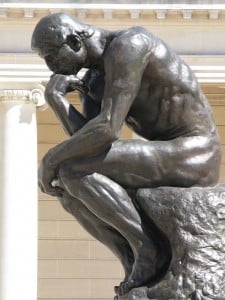During the course of a sprawling but enjoyable combox conversation with atheist commenter Ragarth I posed the question,
…specifically with regard to Christianity: what kind of evidence would you consider sufficient, and what is the evidence it would have to outweigh?
Ragarth invoked parsimony: theism involves an intelligent creator, and an uncaused cause could just as easily be mindless as intelligent:
Specifically regarding intelligent creative forces, there is nothing they can do regarding the creation of the universe that cannot also be explained by a non-intelligent natural force. If an intelligent creator can be uncaused, then why can’t an unintelligent force? If an intelligent creator can create the universe from him/her/itself, then why can’t an unintelligent force? So given this, I believe that in all cases of universal creation that are reasonable given current scientific understanding, the intelligent entity will always have an additional, unnecessary assumption of intelligence.
So what would prove theism for me? Something that breaks the above logic. Evidence that intelligence is a necessary component for the creation of the universe. If that could be proven to a sufficiently likely level, then I’d at least be a deist of some form.
I then asked for Ragarth‘s definition of intelligence, so as to avoid speaking at cross-purposes, and got this response. He (?) comes from a cognitive science background, and suggests this pithy definition:
In regards to this discussion, let us define intelligence as the capacity to think about and understand stimuli.
And so I’m glad I asked. This definition works for human intelligence, so far as it goes, but gets the relationship between God and His creation entirely wrong according to classic theism.
For human beings (leaving the question of animal intelligence entirely to the side), we take in perceptions through our senses: we receive stimuli. We learn some things directly from these perceptions, while other things we need to work for: we need to reason to them. The earth is a sphere; this is not something we can directly perceive from the ground, but it is something we can reason to based on our perceptions (and the ancients did).

God does not have intelligence in this sense, according to the theistic account; He doesn’t need it. God’s intellect is more powerful than ours; where we have to work to know things, and often can know them only in part, imperfectly, God simply knows, and knows perfectly. God doesn’t have senses as we do; rather, He has direct access to all of creation—and that, you might say, from the inside. In theological terms, we say that God is immanent in creation: He is active in all places at all times.
If creation were a computer simulation (Minecraft, say), you might say that God plays the role of the computer on which it is running (among other things). There is no part of the running simulation in which the computer is not intimately involved; and if you were to ask where the computer is in the simulated world the only possible answer is, “Everywhere, sort of, but it’s complicated.” And if the computer were self-aware, we would say that the computer knows everything about the simulated world by virtue of it all being in the computer’s memory. The various animals in a Minecraft world have senses of a sort; but the computer wouldn’t need to use those senses to know what’s going on. It would know.
And so with God. Mind you, theism also claims that God is transcendent as well as immanent: He is active in all places and times in the universe, but He is not identical to the universe, nor is it part of Him.
This is how theism differs from pantheism on the one hand (God is immanent but not transcendent) and deism on the other (God is transcendent but not immanent).
Now, let’s go back to Ragarth’s question. He (?) is looking for “Evidence that intelligence is a necessary component for the creation of the universe.” I don’t pretend to have shown that yet; I’m just trying to “come to terms,” as Mortimer Adler would say. Now it’s Ragarth’s chance to agree or disagree about whether we’ve done so.
____
photo credit: By Yair Haklai (Own work) [CC BY-SA 3.0 or GFDL], via Wikimedia Commons












